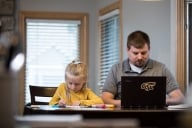You have /5 articles left.
Sign up for a free account or log in.
As a newly appointed president, I awaken each day privileged to serve an engaged, talented, and caring community of learners. I also face each day responsible for helping my campus effectively address the convergence of external forces dramatically shaping higher education today. I approach this position of privilege and responsibility with a deep sense of gratitude and humility.
Higher education institutions, like Wittenberg University, are being impacted by powerful forces in the external environment. Such shifts include a shrinking pool of high school graduates, increasingly price-sensitive families, uncertain program demand, a weak economy, underperforming endowment and investment portfolios, and attenuated donor giving.
Some view such challenges with angst and fear. I view them as remarkable opportunities to systematically engage questions about our core purpose and mission and how they get reflected in the activities, plans, decisions, and budgets of the institution. In fact, I believe ongoing engagement with such questions is essential if we are to consistently deliver on the promise of providing a first-rate liberal arts educational experience for our students.
At Wittenberg, senior administrators have been asked to work within their respective areas to identify cost-containing and revenue-generating initiatives. This semester the campus engaged in a review of several programs and practices within the context of variables such as institutional mission, quality, demand, and cost. Despite significant progress in more closely aligning our current revenues and expenses, we recognize that reducing expenses alone will not lead to a long-term sustainable financial model for the University.
It is widely recognized on campus that we must also create additional revenue-generating initiatives. These efforts must be consistent with our mission and build on historic institutional strengths. Selected examples may include expanding summer offerings and other programs through the School of Community Education, which serves non-traditional students and aligns with Wittenberg’s commitment to lifelong learning and service. Other examples may include offering a nursing completion program built on the historic strength of the natural sciences division or tying a comprehensive internationalization strategy to our nationally recognized East Asian Studies program. The latter would also help actualize the University’s deep commitment to diversity and enhance our efforts to educate students for global citizenship.
While the inductive approach described above has allowed us to implement some efficiency measures quickly, it is now time to institutionalize mechanisms through the shared governance structure to ensure that we develop an integrated and inclusive approach to identify strategic priorities, allocate institutional resources, and assess progress toward goals. For example, we are exploring the creation of an institution-wide planning and budget committee. I anticipate that this group will embrace an overarching focus on shifting the institution toward a sustainable financial model, and that its work will eventually involve a number of sub-groups focused on key areas of strategic importance including: academic excellence, student success, and university-community partnerships.
While we engage in these activities to ensure a sustainable financial future, we also look to others who are experiencing similar challenges and trying new approaches that may be working well. Exchanging ideas and fostering collaboration may even result in powerful partnerships that can strengthen our institutions and contribute to their collective sustainability over time.
I was asked recently why I applied for (and then accepted) a presidency at a liberal arts institution with all the daunting challenges facing such organizations. I responded by saying something to the effect of, “I cannot imagine devoting my life to any more worthwhile endeavor given that our colleges and universities help students discover their passion and purpose in life.” In my experience, it is not uncommon for the work on our campuses to transform the lives of students who go on to change the world for the better. Now, that is a cause worth sustaining!
Laurie M. Joyner, President
Wittenberg University
Springfield, Ohio

Want articles like this sent straight to your inbox?
Subscribe to a Newsletter





